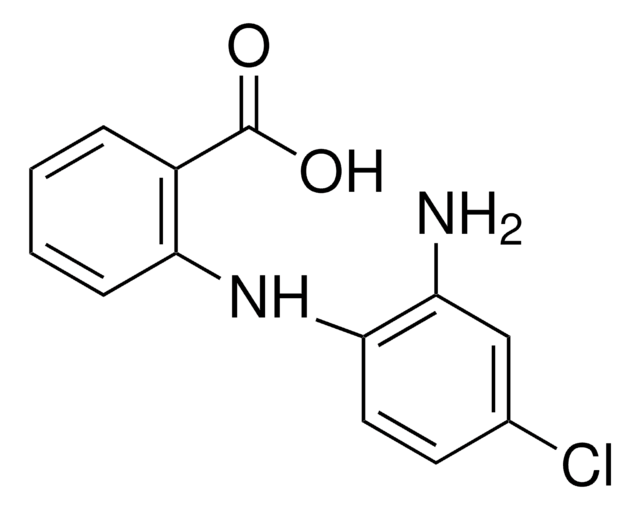31748
Sudan Orange G
≥97% (HPLC)
Synonym(s):
2,4-Dihydroxyazobenzene, 4-(Phenylazo)resorcinol, SOG
About This Item
Recommended Products
Assay
≥97% (HPLC)
mp
143-146 °C (lit.)
λmax
≤388 nm (lit.)
SMILES string
Oc1ccc(\N=N\c2ccccc2)c(O)c1
InChI
1S/C12H10N2O2/c15-10-6-7-11(12(16)8-10)14-13-9-4-2-1-3-5-9/h1-8,15-16H/b14-13+
InChI key
BPTKLSBRRJFNHJ-BUHFOSPRSA-N
Looking for similar products? Visit Product Comparison Guide
Signal Word
Warning
Hazard Statements
Precautionary Statements
Hazard Classifications
Eye Irrit. 2 - Skin Irrit. 2 - STOT SE 3
Target Organs
Respiratory system
Storage Class Code
11 - Combustible Solids
WGK
WGK 3
Flash Point(F)
Not applicable
Flash Point(C)
Not applicable
Personal Protective Equipment
Regulatory Listings
Regulatory Listings are mainly provided for chemical products. Only limited information can be provided here for non-chemical products. No entry means none of the components are listed. It is the user’s obligation to ensure the safe and legal use of the product.
JAN Code
31748-6X25G:
31748-4X1KG:
31748-1KG:
31748-2.5KG:
31748-VAR:
31748-25G:
31748-BULK:
Certificates of Analysis (COA)
Search for Certificates of Analysis (COA) by entering the products Lot/Batch Number. Lot and Batch Numbers can be found on a product’s label following the words ‘Lot’ or ‘Batch’.
Already Own This Product?
Find documentation for the products that you have recently purchased in the Document Library.
Our team of scientists has experience in all areas of research including Life Science, Material Science, Chemical Synthesis, Chromatography, Analytical and many others.
Contact Technical Service








